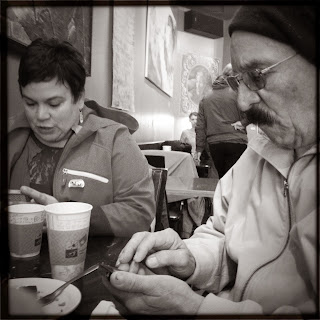An article on Carol Shipley’s new book,
Love, Loss and Longing: Stories of Adoption, took my breath away this morning.
Her words had played out in my head for so many years. She said she wanted to be the voice for the voiceless. I had lost my voice years ago. I gave up to become what society wanted me to be.
I became white, Puerto Rican, and an academic over-achiever. My parents glowed as they would say, “It’s not us. She’s naturally smart. She’s so
neat and intelligent. It’s in her genes.” They were proud, and I wanted to please them.
My academic achievements were also driven by my outward appearance. As an Asian, I was viewed as a mathematical genius. Teachers and college professors would encourage me to pursue mathematics. Mathematics did come naturally to me, but I yearned to express myself in words and artwork.
Shipley is quoted in the article saying that adoptees internalize an “adoption bargain” that manifests in the need “to be a perfect model daughter so the choice that the adoptive parents made will have been worth it.”
While I know my parents would love me no matter my performance, internally, I struggled with myself to be perfect in every way. I still exhibit this as an adult. I want to be the model parent, the model wife, the model person. As I spiral, I see this quality in my son. He also wants that perfection. He fears failure. Good grades are often not enough for him. I want to help him, but I still find myself struggling with the same demons.
Is there a person in Korea who could help me? Or did that person fear failing in parenthood? By all accounts, she did an excellent job in nurturing me until I was six months old. Her care and nursing has kept me healthy, and I have passed on
her flora to my own children.
Here’s where my feelings rush in. I wonder about her and have since that first moment I knew I was pregnant. Not being able to ask her what she felt as I moved underneath her skin is a difficult feeling to suppress.
Shipley says, “The adoptee goes through life not wanting to hurt others, and in doing so, buries her own hurt.”
As a child, my hurt was recorded privately in journals. There are volumes of journals in our basement, spanning the days of “I love Donny Osmond,” to this blog. My emotions rush out on paper or over the keys. I also put much of my energy in trying to help others who might be in need or hurting. Social activism is my outlet. And sometimes, the hurt for others overcomes me.
This blog has helped me to know that others are out there hurting as I have. It has been a cathartic journey. I thank you for following; it heals me.



























